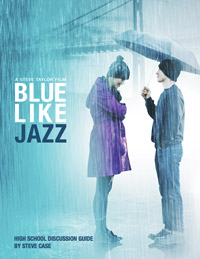The movie tells the story of Don, a 19 year-old, and his journey from his evangelical Christian roots in Texas to the anti-God and anti-religious world of Reed College in Portland, Oregon.
The film's satirical swipes at Christianity brought lots of laughter from the audience, including from me, but then, about midway, a shift in tone occurred, when Don finally meets an actual committed Christian at Reed, and not a closeted one.
Penny, the "out" Christian, goes to church--apparently to an Episcopal Church--takes her faith in Christ seriously, and strives to live the life of love that Jesus lives and teaches as the way to life in abundance. Penny spends her Christmas break working with refugees in Kashmir.
She shows Don that it is possible to be a Christian authentically and with integrity, despite Don't own personal experience: Don has just learned that his mother is pregnant by his home church's married youth pastor, who had been his friend. Now, he sees for himself the hypocrisy of the supposedly religious and has all the more reason to join in the rejection of Christianity, so popular among the other college students.
Toward the end of the film, Don has an epiphany, aided by the loving witness of Penny. It takes place in a mock confessional, part of a week on campus of mock-everything-that-is-holy. He realizes that his mother is human, that she needs his love. Love is what true religion is about. Not condemning others who fail to love, but taking responsibility and loving others, as he had been taught for all those years in church.
"Blue Like Jazz" critiques both the wrongs of Christianity and the wrongs of secularism. It takes a lot of punches, too. In the latter case, secularists ridicule what they don't understand and reject what challenges their secure world view--that science, for instance, is the sole source of meaning and value. There's a terrific scene in the film where an atheist and a theist debate, Does God exist? Yes, he does, I could almost hear Don say.
More significantly, those who reject and condemn faith might do so because of deep hurt and disappointment. This is the case for the Pope, Don's friend at Reed, who has been chosen by the students to speak for God for the year. Ironically, the Pope is an atheist and is vehement in his attacks on God, Christianity, the church, and especially on the Roman Catholic Church, because as a child, he was raped by a priest in the sacristy. (The Pope and Don put a giant condom on a church steeple and post a sign that says, "Don't reproduce.")
I understand the Pope--of the film, that is. (The other one is a complete mystery to me.) In the Roman Catholic Church of my childhood and adolescence, I experienced deep and lasting physical and emotional abuse, although, thank God, never sexual abuse. As a consequence, I have great sympathy, even empathy, for people who have been hurt deeply by religious people--people who were supposed to show others the love of God in Jesus, but who hurt them instead. I understand why they reject the abusive institution. (Jesus knows something about being abused--crucified, actually--by religious people.) One reason I am a priest is to try to show others that God is love. To give God and his followers a good name.
At the end of the film, Don has come to reconsider his rejection of Christianity. Now, he's the new Pope, succeeding his friend. He speaks for God now. Don sits in his mock confessional, listening to the old Pope tell of the abuse he suffered in that sacristy, and Don says, "I'm sorry." And he goes on saying, "I'm sorry" for God to everyone who visits him in the confessional and has a story of hurt to tell.
Yes, Christians have done stupid and cruel things, and will likely go on doing them, because we're tragically flawed--imperfect. Don realizes this truth. He sees his own sin, I think.
Sinners though we are, God goes on loving all of us and hoping that one day we'll understand who God is--love; God tried to get that message across in his son. God goes on hoping that one day, even today, we'll start to live the way he wants us to live, which is the way of radical unconditional love.
God doesn't want to be blue forever, because of what we people who believe in him do to one another and to others. God thinks the best of us, that one day, we his children, will make God proud.
While the secularists at the movie version of Reed College and elsewhere sneer at all things and all people religious, this is one Christian who will go on trying to do his best for Christ, with the Spirit helping me; and saying, with Don, "I'm sorry" for my and others sins of omission and commission.

Sounds like a very interesting movie. Thanks for sharing this review and reflection.
ReplyDeleteDoris